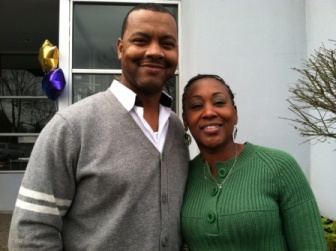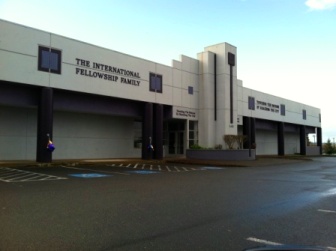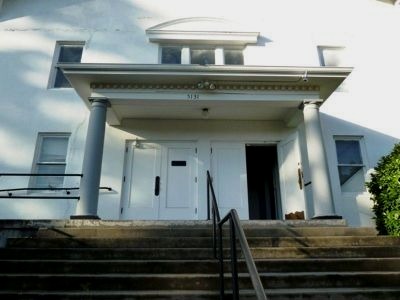 Bishop Steven Holt and Lady Aundria Holt outside of The International Fellowship Family building on 122nd Avenue. The Evangelical Christian Credit union is foreclosing on the building in a deal that also gives the credit union the church's previous home in the Alberta Arts District. Bishop Steven Holt and Lady Aundria Holt outside of The International Fellowship Family building on 122nd Avenue. The Evangelical Christian Credit union is foreclosing on the building in a deal that also gives the credit union the church's previous home in the Alberta Arts District. |
The International Fellowship Family, one of Portland's foremost multicultural churches, has become the latest casualty of the national economic slump. Furniture, sound equipment, pew chairs and anything that can't be stored is up for sale, as church members prepare to leave behind the building on 122nd Avenue that they moved into with high hopes just seven years ago.
A "For Sale," sign now hangs on the wall above the church's mission statement: "Touching the Nations by Reaching the City." The building is in foreclosure, and church leaders are still looking for a new home for the congregation.
It wasn't supposed to be this way.
"We were in a really good position before the housing crash," says senior pastor, Bishop Steven Holt. "I negotiated very favorable terms with our lender and utilized our positive equity to position us tremendously."
Holt is one of six innovative church leaders who came together to create the 11:45 Movement, which formed after a spike in youth violence. Church members have turned out in unprecedented numbers to become mentors and build stronger support systems for youth and families. A graduate of Warner Pacific College, Holt's ministry career started when he became a youth pastor in 1986.
 A Church Working for Families
A Church Working for Families
Founded in 1977 by Holt's father-in-law, Dr. James Coleman, the International Fellowship Family holds a tight focus on strengthening kids and families. Members include believers of 11 different nationalities. Through its nonprofit, The Safe Place, it offers high quality childcare and support to low-income families. It runs a summer camp for kids, keeps teens busy with activities, and helps give low-income students confidence by making sure they have backpacks and school supplies. Until the school district ran out of funding, it partnered with Parkrose High School's Teen Parent Program to care for the children born to teen students.
Over the years The International Fellowship Family grew, attracting socially progressive Christians, including the late Rob Ingram who headed Portland's Office of Youth Violence Prevention until his sudden death last November.
But with success came the need for a larger space. The church already owned its first home in the Alberta Arts district at 5131 N.E. 23rd Ave. A former Masonic Temple with a beautiful 7,388-square-foot interior, at the time, 2006, that building was valued at around $1 million.
So the church used it as collateral to buy a larger building at 4401 N.E. 122nd Ave. and took out a $2.1 million loan. Holding their mortgage was the Evangelical Christian Credit Union, based in Brea, Calif., the largest church lender in the country.
"When the economy was good we had $3.2 million in assets, between the two buildings," says Bishop Holt. "But when the economy changed, building values changed. So we went from this great position to this really tight position."
What happened then has now become part of the history of this country.
The Financial Sector Goes Rogue
During the 1990s and into the 21st century property values rose quickly. The mantra from every side was that the best investment anyone could make was in bricks and mortar. Common wisdom said property would always increase in value. Wouldn't it? Homeownership was billed as the surest way to build intergenerational wealth.
It was a powerful lure for poorer Americans, those who had been denied opportunities to amass wealth in previous generations.
African Americans jumped to buy homes along with everyone else. But just like other people of color, Black Americans were disproportionately steered toward a new type of mortgage—the sub-prime loans that start off with very low payments but balloon after a year or more. The church's loan was not this type, but the fallout from these new loans and financial products, along with an overvalued property market, created a crisis that ended up taking down the church.
Those in charge of the financial services industry didn't seem to care that more people were likely to default. Looking for new ways to profit on mortgages, lenders chopped up the riskier loans into tiny segments and bundled them with other loans, which were then traded on Wall Street.
Frank Partnoy, professor of law and finance at Yale University, says credit ratings agencies overvalued these "second-level" mortgage backed securities. But, because everyone involved was making big profits, nobody questioned those ratings.
Most borrowers weren't concerned about the risks either. If something unexpected was to happen – say a catastrophic illness or unemployment—they could simply sell and pay off the loan. Flipping houses was viewed as a smart way to make money.
But along the way, the sub-prime loans began to balloon. A cohort of homebuyers found their mortgages rising, sometimes doubling overnight. More and more people – disproportionately people of color—found themselves over their heads, and they began to default. More and more homes dropped onto the real estate market at discounted prices.
Property values plummeted and so did investor confidence. The financial markets went into freefall. Companies were forced to downsize or had to file for bankruptcy.
In 2008, this vicious cycle dragged the U.S. economy into a severe slump. On the ground, the crash meant businesses tanked, millions of people lost jobs, and governments lost so much tax revenue state that local budgets were sent into chaos. Black families were hit hard, since 59 percent of their personal wealth came from their home, compared to around 44 percent for Whites. It was the same story for Latino families. Almost two-thirds of their net worth was in home equity.
From Bailouts to Busted
With the entire global economy under threat, President Bush and President Obama were forced to oversee the biggest bank bailout in history. A Bloomberg Markets magazine article by Bob Ivry, Bradley Keoun and Phil Kuntz, published Nov. 27, 2011, says that bailout was even bigger than the public were told, amounting to $7.7 trillion.
The International Fellowship Family had been in good shape, paying its $11,275 mortgage every month, without a problem. But when church members began to suffer from unemployment and financial troubles, they couldn't tithe as generously.
"Our income comes solely from tithes and plate offerings," says Holt. "During the economic downturn, we lost up to 80 percent of our revenues. So we were struggling and we got two payments behind."
At the same time, the value of both church properties declined.
"They both lost $400,000," Holt says.
Now the church was in trouble.
 The church put up this building at 5131 N.E. 23rd Ave. as collateral on their mortgage. After the foreclosure the credit union owns both buildings |
Holt kept up constant communication with the Evangelical Christian Credit Union. They made an agreement to try to work through the debt. After a difficult discussion, where a credit union loan officer said the church wasn't making the mortgage a priority, Holt says they pulled out the stops.
"It was not a matter of irresponsibility with money or communication," Holt says. "It was about getting through the economic downturn with a large church."
Commercial loans are usually refinanced every 3 to 5 years. By Feb. 2011, when it was time to renew its mortgage, the church had paid off their $22,550 debt, and was current with the loan.
But Holt says the loan officer told them he would have to restructure the loan, which would mean a higher interest rate, a higher monthly payment and new closing costs.
"We caught those payments up, but he said it wasn't good enough," Holt says. "He wanted a new payment and new fees, with the closing costs due immediately. They wanted $29,000, and they wanted it within 10 days."
Holt says they tried to negotiate making payments on that $29,000, by rolling it into their mortgage payment, or deferring the fees till the end of the loan, but were refused.
"They said 'No,' and that's how we went into foreclosure," Holt says. "Now they get both buildings and they are both very marketable. I don't think they would have done it, if they hadn't thought they could sell this building –if they hadn't seen it as marketable."
A Christian Credit Union with a Heart of Gold?
According to a Reuters article by Tim Reid, published March 9, record numbers of churches are facing foreclosure. The International Fellowship Family is one of 270 churches that have been sold because of inability to pay loans, since 2010.
The list of casualties includes such venerable institutions as Charles Street African American Episcopal Church in Boston, founded in 1818. A center of the anti-slavery movement, the church has hosted historic events such as speeches by Frederick Douglass and Wendell Phillips. Now it's battling for its life with America's largest Black-owned bank OneUnited, over a $1.1 million balloon loan.
Based in Brea, California, the Evangelical Christian Credit Union is a conservative Christian lender that dates back to 1964 when it was called the Conservative Baptist Credit Union. CEO Mark Holbrook, who joined the credit union in 1975 and rose to lead it by 1979, expanded the number and size of its loans, socking away assets and turning it into a church lending powerhouse.
"Our core assets have grown from $43 million to over $1.2 billion, and total assets under management exceed $3 billion," it says on its website.
ECCU was so successful that rival lenders complained it was making larger loans than bond firms deemed prudent, based on churches incomes and property values. ECCU said its lending rules were strict enough.
"Our first foreclosure ever was in 2007," says ECCU representative, Jac La Tour. "It was a very new experience for us. If you look at a business analysis of churches, they are one of the strongest credit risks possible. Ministries are very committed and dedicated to keeping up their loans.
"For a long time we were one of the few financial institutions that would provide financing for underserved urban communities," he said.
In 2008, Holbrook was paid $943,797, one of three ECCU executives who made above $700,000, according to the Orange County Register. That year, at the beginning of the real estate market crash, the credit union made $14.9 million. And its assets under management grew to $3.4 billion.
"One important reason for this performance is the overwhelmingly faithful involvement of our member ministries," says its 2008 financial statement. "Our members, after all, are ECCU—we are a financial cooperative, not just a financial institution."
But everything was about to change.
In 2009 ECCU lost $3 million. In 2010, it lost $15.8 million. And in 2011 ECCU lost $19.2 million. More and more churches were in trouble as their members lost jobs and church giving declined.
The crisis also hit other lenders. Church Mortgage and Loan Co. filed for bankruptcy in 2008 after one third of its loans went into foreclosure.
Like credit unions across the country ECCU ratcheted down its lending and focused on building up reserves, so it could weather the financial crisis.
"We created an entire department to identify ministries at risk and help them become financially healthy," says La Tour. "That department didn't exist four years ago."
And as churches found themselves unable to pay their loans, the credit union also filed foreclosures. Recently, for example, ECCU foreclosed on Solid Rock Christian Church in Tennessee, for a $2.9 million loan. Since the crisis began ECCU has foreclosed on about 35 churches.
La Tour says ECCU tries to work with borrowers whenever possible.
"We never move to foreclosure without trying as hard as possible to move in the other direction," he says. 'In many cases we have worked out loan modifications to help ministries. But every situation is different. "
"We Didn't Get a Bailout"
Bishop Holt says that ECCU refused to give The International Fellowship Family what they needed most: time. Under the refinancing proposal, the new mortgage rate would have been 5.75 and the new payment would have been $12,000 a month. Holt said the church was willing and able to pay that, but raising the $29,000 fee would have taken time.
"An interesting thing is that God and our people stepped up to the plate on a regular basis," he says. "I was confident that with time we could have executed our commitment. But they just wouldn't give us any time."
Holt says as he looked around he saw firms closing, jobs disappearing, and families struggling while government scrambled to repair a broken economy.
"Unfortunately, the credit union was acting like none of those things were happening," Holt says. "It was a problem that was affecting everyone. This was not just a group of people who decided to be difficult, but there was no recognition of that. We didn't get a bailout."
La Tour says the credit union has to take care of all of its members, which means making hard decisions. He said he didn't know enough about The International Fellowship Family's situation to comment, but that the dramatic fall in property values has been behind many foreclosures.
"In some places the values dropped by 50 percent," he says. "The math just doesn't work anymore so it becomes a very challenging situation for a lender."
With pressure on the credit union to reduce its risk, did ECCU foreclose on this church when it could have worked with them instead? Could ECCU have made a mistake with International Fellowship Family?
"Could someone have made a mistake? People make mistakes," La Tour says. "I trust our staff and I know how committed our staff is to doing the best thing. In terms of our intent to do the best for our credit union and the ministries it serves, I can confidently say our intention is to do so."
Today you can find The International Fellowship Family's two buildings listed for sale on real estate websites. Depending where you look, the church in the Alberta neighborhood is priced between $495,000 and $558,000. The building on 122nd Avenue is listed at $670,320 on one site that also mentions it was last sold for $1.7 million.
Warner Pacific College Offers a Safe Haven
Church members say leaving their building is hard, but they express faith that God will bring new opportunities to the church.
"It's really hard," said Melody Jackson, director of the Safe Place program. "It's a shame, but we will rise above this and we will get another building in God's timing. It's a new adventure!"
Holt says he trusts what the Bible says in Romans, 8:28,
"All things work together for the good of those who love God," he says. "So our confidence is that this is working for our good; that it's a bad thing, but it is working for our good.
"We accomplished some significant things in Parkrose and we have no reason to hang our heads."
Last Sunday, March 11, the church gathered to worship on 122nd Avenue for the last time. Next time they meet, it will be on the campus of Warner Pacific College. Holt has a longstanding close relationship with the Christian college and regularly preaches there. Holt says he is excited about the opportunity to partner with the college.
"We'll be there for a year at least," he said. "We're working on expanding our partnership. Warner Pacific is preparing people to do what I do every day. So college students will be able to come to us and get hands on experience in a multicultural environment. And that is tremendous."


















































































































































































































































































































